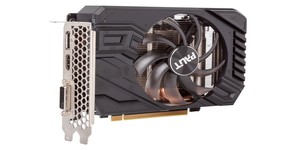Nvidia GeForce GTX 1060 Founders Edition Review
Written by Matthew Lambert
July 19, 2016 | 13:58
Tags: #founders-edition #gp106 #gtx-1060 #pascal
Companies: #nvidia

Power Consumption (Idle and Gaming)
In order to get an idea of a GPU's power draw, we run our Unigine Valley 1.0 benchmark, which is our most GPU limited test. We use a watt meter to measure the maximum total system power draw during the test, and also take an idle reading at the Windows desktop (3,840 x 2,160).Power Consumption
Idle (Windows 8.1 Desktop) and Load (Unigine Valley 1.0)
- Palit GeForce GTX 960 Super JetStream 2GB
- Nvidia GeForce GTX 1060 Founders Edition 6GB
- Asus GeForce GTX 970 DirectCU Mini 4GB
- AMD Radeon RX 480 8GB
- AMD Radeon RX 480 4GB
- Nvidia GeForce GTX 980 4GB
- Sapphire Radeon R9 380 ITX Compact 4GB
- Asus GeForce GTX 1070 Strix OC 8GB
- EVGA GeForce GTX 1080 FTW 8GB
- Nvidia GeForce GTX 980 Ti 6GB
- AMD Radeon R9 Fury X 4GB
- Sapphire Radeon R9 390X Nitro 8GB
-
-
125
-
262
-
-
-
121
-
270
-
-
-
125
-
295
-
-
-
134
-
300
-
-
-
135
-
301
-
-
-
123
-
331
-
-
-
128
-
331
-
-
-
122
-
340
-
-
-
123
-
373
-
-
-
128
-
408
-
-
-
133
-
452
-
-
-
127
-
497
-
0
100
200
300
400
500
System Power Draw in Watts (Lower Is Better)
-
Idle
-
Load
Thermal Performance (Idle and Gaming)
Thermal output is also measured using Unigine's Valley 1.0 benchmark. The GPU is installed in a closed, but fairly well ventilated case (Corsair Graphite 760T) with HDD cages removed and the case fans at full speed. We leave all GPU fan profiles and settings as they come and leave the benchmark running for ten minutes so that temperatures plateau. We record the peak GPU temperature using GPU-Z, and present the data as the delta T (the difference between the GPU temperature and the ambient temperature in our labs). We also take an idle reading at the Windows desktop (3,840 x 2,160).Temperature
Idle (Windows 8.1 Desktop) and Load (Unigine Valley 1.0)
- AMD Radeon R9 Fury X 4GB
- Asus GeForce GTX 1070 Strix OC 8GB
- Palit GeForce GTX 960 Super JetStream 2GB
- Asus GeForce GTX 970 DirectCU Mini 4GB
- Sapphire Radeon R9 380 ITX Compact 4GB
- Nvidia GeForce GTX 1060 Founders Edition 6GB
- EVGA GeForce GTX 1080 FTW 8GB
- Sapphire Radeon R9 390X Nitro 8GB
- AMD Radeon RX 480 8GB
- Nvidia GeForce GTX 980 4GB
- AMD Radeon RX 480 4GB
- Nvidia GeForce GTX 980 Ti 6GB
-
- 6
-
31
-
-
18
-
39
-
-
-
11
-
45
-
-
-
9
-
51
-
-
-
15
-
53
-
-
-
11
-
54
-
-
-
27
-
54
-
-
-
20
-
55
-
-
-
14
-
59
-
-
-
15
-
59
-
-
-
17
-
62
-
-
-
16
-
63
-
0
10
20
30
40
50
60
70
Delta T in °C (Lower Is Better)
-
Idle
-
Load









Want to comment? Please log in.